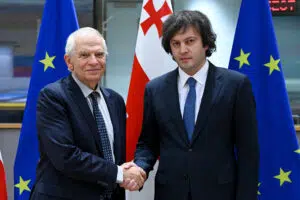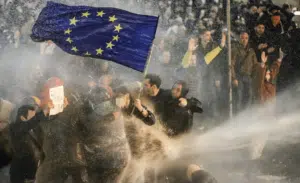Brussels – After the historic achievement of being granted EU candidate status, the challenge of moving closer to the Union has just begun for Georgia. “We have ambitious plans for integration; by 2030, Georgia will be ready for membership more than any other candidate country,” affirmed Georgia’s Prime Minister Irakli Kobakhidze at a press conference in Brussels today (Feb. 20) at the end of the eighth session of the EU-Georgia Association Council. Or, to put it in more direct terms, “By 2030 at the latest, Georgia will be an EU member.”

The goal was set by the prime minister who took office last Feb. 8, in an exchange of roles with ex-premier Irakli Garibashvili (who in turn replaced Kobakhidze at the head of the ruling Georgian Dream party) to prepare the way for the legislative elections scheduled for Oct. 26. Elections described as “an important test for Georgian democracy” by the EU High Representative for Foreign Affairs and Security Policy, Josep Borrell, who urged the government to “complete reforms with all recommendations for free, fair, and competitive elections.” Returning to the issue of accession to the Union, Premier Kobakhidze assured that in Tbilisi, “we are not looking for shortcuts,” but that today “we wanted to demonstrate our progress to meet our commitments” toward the next step in the process: “Opening accession negotiations and integrating into the Single Market.”
Georgia’s request to join the EU came on Mar. 3, 2022, one week after the start of the Russian invasion of Ukraine. Three months later, the von der Leyen cabinet indicated to Tbilisi the need to work on a set of priorities, with the final decision of the European Council on Jun. 23 that approved the line drawn by the commission: while Ukraine and Moldova became candidate countries, Georgia received only the “European perspective”. In a year and a half of work, the national authorities managed to complete 3 out of 12 priorities—as confirmed by the Enlargement Package 2023-—but the EU Commission still decided to indicate to the twenty-seven the possibility of granting Tbilisi candidate status “subject to certain measures”: more precisely, alignment with the Union’s foreign policy, countering political polarisation, implementation of judicial reforms, the fight against corruption and oligarchs, and implementation of the strategy for human rights, media freedom, and civil society engagement. The decisive step in Brussels was taken at the last European Council on December 14-15, when the 27 EU leaders decided to make Georgia the ninth official candidate country to join the Union.
High Representative Borrell himself was keen to emphasise the fact that newly appointed Prime Minister Kobakhidze’s first foreign visit was to Brussels: “It shows that you take the EU path seriously.” But this does not lighten the work Tbilisi has to do for “meaningful alignment in the coming years” with the Union’s Common Foreign and Security Policy (CFSP)on combating disinformation, information manipulation, and foreign interference (“we will see more of that with the European elections and your elections”) but especially on implementing reforms according to the nine yet unmet priorities: “The door is open, you have to go through it respecting the criteria that are the same for everyone,” Borrell reiterated. He was echoed by the Commissioner for Neighborhood Policy and Enlargement, Olivér Várhelyi: “We need to capitalise on the council’s decision; we call for accelerating the work on reforms to move to the next stage.” In the meantime, progress on so-called “advance integration” in specific areas can be looked at: “We have everything in place to propose to the council to integrate Georgia as soon as possible to the roaming area; it would be a change that citizens can see in a tangible way on par with visa liberalisation,” Commissioner Várhelyi assured.
The political situation in Georgia
Despite being granted candidate status for EU membership, the relationship between Brussels and Tbilisi remains particularly complex due to the disconnect between an overwhelmingly pro-EU population and a government that is at least controversial about pro-Russian tendencies (although it has since applied to join the Union due to fears raised by Kremlin expansionism). Not only is the difficulty in implementing the reforms required by the path to the Union evident but over the past two years, there have been incidents that have highlighted the ambiguity of the ruling Georgian Dream party: its founder, the oligarch Bidzina Ivanishvili, appears in the non-binding resolution of the EU Parliament calling for personal sanctions against him. For example, in May last year, flights between Georgia and Russia resumed after Moscow’s decision to lift the existing ban, and the Caucasian country never aligned with the restrictive measures introduced by Brussels against the Kremlin after it invaded Ukraine. Last fall, the government also attempted (but failed) to impeach the President of the Republic, Salomé Nino Zourabichvili, for a series of trips to the European Union that would have been a violation of the powers of the head of state under the national Constitution.

Georgian protesters’ pro-EU protests in Tbilisi, Mar. 7, 2023 (credits: Afp)
Straddling Brussels’ June 2022 decision not to grant Georgia candidate status yet, two large pro-EU demonstrations were held in Tbilisi: one “March for Europe” to reiterate the people’s alignment with the values of the Union and a public call for the government to resign. The common features of these demonstrations were flags (five red crosses on a white field, national, and the twelve stars on a blue one), signs with pro-European claims, and the Georgian anthem interspersed with the Ode to Joy. Then, in March last year, harsh widespread protests erupted against a controversial pro-Russian “foreign influence transparency” bill to register all organisations receiving more than 20 per cent of their funding from abroad as “foreign agents” (similar to what has been in effect in Russia since Dec. 1 last year). After first-reading approval by the parliament, tens of thousands of Georgian citizens took to the streets with Georgia and EU flags, shouting slogans such as Fuck Russian law and papering the city with insults to Putin, backed by both EU institutions and President Zourabichvili. After two days of uninterrupted protests, the Georgian Dream party withdrew the bill without disavowing its initiative.
In this scenario, Georgia’s particularly delicate relationship with Russia, a country it borders to the north, should not be forgotten. Its candidacy for EU and NATO membership—enshrined in its national Constitution—has long been a cause of tension with the Kremlin. After conflicts in the 1990s with the two separatist regions of South Ossetia (1991-1992) and Abkhazia (1991-1993) following Georgia’s 1991 independence from the Soviet Union, on the ground the situation was effectively frozen for 15 years, with troops of the newly formed Russian Federation defending the secessionists within the claimed territory. The attempt to reassert Tbilisi’s control over the two regions in the summer of 2008, intended by then-President Mikheil Saakashvili, led to a violent Russian reaction on Aug. 7, not only in repelling the Georgian army’s offensive but also leading to the invasion of the rest of the national territory with tanks and air raids for five days. Since then, Vladimir Putin‘s Russia has recognised the independence of Abkhazia and South Ossetia and has deployed thousands of soldiers to the two territories to increase its sphere of influence in the Ciscaucasia region, in violation of the Aug. 12, 2008 agreements.
English version by the Translation Service of Withub




